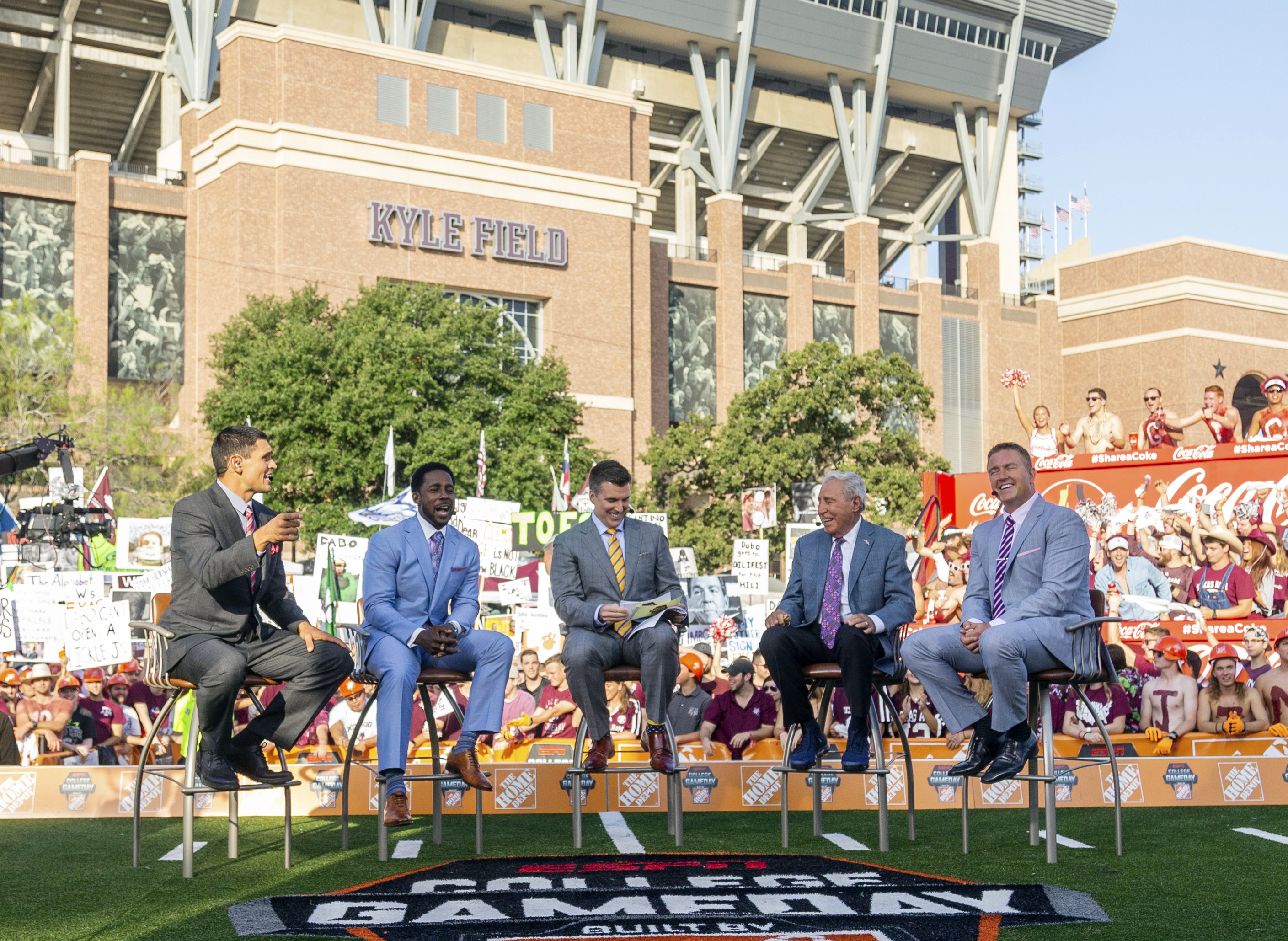The Big Ten is open to playing non-conference games in November as it moves into the expansion era, with the conference growing to 18 schools next year and the College Football Playoff to 12 teams.
“It’s a conversation we’re open to,” chief operating officer Kerry Kenny told the Hotline on Thursday following the release of the Big Ten’s conference schedule rotation for a five-year period.
“We haven’t had any in-depth discussions, but we want to be thoughtful.”
Reconfiguring the Big Ten schedule to accommodate a non-conference game in November would be a deeply complicated process that could take years to implement because of non-conference matchups under contract for the opening weeks of future seasons.
Before the conference office begins modeling scenarios, the Big Ten schools and media partners would need to show enough interest to justify the process.
To this point, Kenny said, the focus has been on determining the multi-year schedule rotation once the four West Coast schools join the conference next summer.
Creating a late-season Saturday for non-conference games could allow Washington and Washington State to play the Apple Cup in a more traditional window once the schools are in different leagues. The same goes for Oregon and Oregon State. (The status of both rivalries is uncertain beyond this season.)
But Kenny said there’s a strategic consideration that would impact every school: Putting as many teams as possible in position to reach the playoff — and be fresh enough to thrive in the postseason.
Here’s another consideration: The SEC.
The expanded playoff format features four rounds. Teams that participate in conference championship games and then play in the opening round of the CFP must endure a grueling schedule throughout November and early December, with one week off before the CFP.
The playoff begins on the third week of December in the 2024-25 seasons. Details for 2026 and beyond, when a new media contract kicks in, have not been finalized. But if the format mirrors the 2024-25 schedule, a non-conference game in early or mid-November could offer a needed respite.
For years, the SEC has carved out the first Saturday in November for non-conference cupcakes with the express purpose of keeping its teams fresh for stretch-run showdowns — this, in addition to playing only eight league games.
The Big Ten grind could be far more daunting given the additions of USC, UCLA, Oregon and Washington and the requirement that teams play nine conference games.
Of course, the media partners would push back on any plan that left them with no high-level matchups on a given Saturday. So the conference couldn’t allow everyone to step outside of league play on the same day. (Not even the SEC does that.)
But the Big Ten should consider hitting the refresh button in some manner — late-season byes are another option — to even the field with its rival.
The changes in conference composition combined with the difference in the number of league games and the SEC’s November cupcakes could create a marked competitive disadvantage for the Big Ten that impacts CFP participation, seeding and success.
Freeing up the first or second Saturday in November for non-conference games might be a viable mitigation option.
Kenny addressed several other topics related to scheduling:
— On the release of the 2024 football schedule: “Our athletic directors have charged us with getting them a draft for review this month,” he said. At that point, there could be multiple revisions before a final version is approved.
— On guardrails for teams playing on Friday nights, specifically regarding what would be asked of the team the previous Saturday. “We’re working with our network partners to nail down what all those parameters would look like.”
Kenny added that first and foremost, the Big Ten would apply the “common sense test” so the schedule “doesn’t undermine, on paper, a team’s ability to compete for the championship.”
— On the West Coast teams playing home games at 7:30 p.m.: “That’s a topic of conversation not just with the schools on the East Coast but our 14 members in the Eastern and Central Time Zones,” he said. “We need to be strategic.”
— On whether the Oregon-Washington game would be played on the final weekend of the regular season given that it qualifies as a protected rivalry game under the Big Ten’s format: “We haven’t in earnest put pen to paper,” he said. “We’re still discussing the model with both institutions.”
— On the release of the home-road opponents in men’s and women’s basketball for the 2024-25 season: “There is no definitive timeline,” he said, “but for the non-football sports, our goal is to have the schedule formats pinned down by the end of the calendar year.”
*** Send suggestions, comments and tips (confidentiality guaranteed) to pac12hotline@bayareanewsgroup.com or call 408-920-5716
*** Follow me on Twitter: @WilnerHotline
*** Pac-12 Hotline is not endorsed or sponsored by the Pac-12 Conference, and the views expressed herein do not necessarily reflect the views of the Conference.
Related posts:

(AP Photo/Ralph Freso, File)
Wilner Hotline: Nine Need-to-Knows for Week Seven Wilner Hotline: Sunday Reactions to Saturday Games
Wilner Hotline: Sunday Reactions to Saturday Games

(AP Photo/Sam Craft, File)
Wilner Hotline: Pac-12 Welcomes Back ESPN College Gameday
(AP Photo/Darryl Webb)
Pac-12 basketball: Our first transfer portal power rankings of the 2023 offseasonBrad Cesmat
Media personality Brad Cesmat first rose to fame in Southern California with the launching of "The Mighty 690" all-sports radio station in the late 1980's and early 90's. Brad came to Arizona in 1993 to begin a 10-year run at KTAR Radio followed by nine years at KTVK-TV in Phoenix. Brad is the Founder/ CEO of Sports360AZ.com. His vision of multi platform content marketing through sports began in September of 2011. Cesmat has served on the Advisory Board for the Salvation Army for the last 18 years. He and his wife Chris have four children.